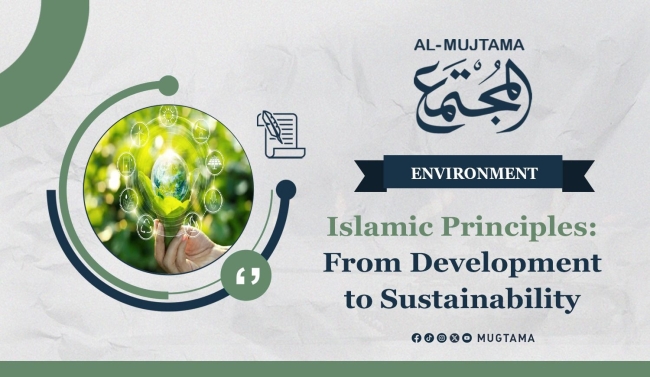The relationship between humans and the environment has always been a focal point in Islam, as this divine religion provides clear guidance on preserving the earth and utilizing its resources in ways that benefit humanity and other creatures. The importance of environmental conservation is evident in the Qur'an and the Sunnah, where numerous principles align with the modern goals of sustainable development.
Islam views the environment not merely as a setting where humans exist but as a trust and a blessing from Allah that must be preserved and used wisely. The earth is not private property but a shared resource entrusted to humanity to achieve common good, ensuring a balance between individual rights, societal rights, and the rights of future generations.
Positive Development of the Earth
Allah says: "He has produced you from the earth and settled you in it" (Hud: 61). The term "settled" here is interpreted positively, implying the cultivation of the earth and sustainable utilization of its resources. This concept carries profound implications, including:
1. Planning and Resource Conservation:
Islam encourages moderate use of resources. In a hadith, it is reported that Ibn Umar said: "The Messenger of Allah (ﷺ) saw a man performing ablution and said, ‘Do not be extravagant, do not be extravagant (in using water’" (Ahmad). This highlights the importance of avoiding extravagance, even during times of abundance.
2. Ecological Balance:
Allah created humans and subjugated the earth to them, but without exploitation that would harm its natural balance. Maintaining equilibrium between humans, animals, and plants is essential. The Prophet ﷺ emphasized environmental stewardship, as in the hadith: "If the Final Hour comes while you have a shoot of a plant in your hands and it is possible to plant it before the Hour comes, you should plant it" (Ahmad).
3. Innovation in Resource Management:
Employing technology and creativity to maximize resource efficiency while minimizing environmental harm is vital. This includes developing smart irrigation systems to reduce water waste and protect soil fertility, as well as adopting renewable energy sources like solar and wind to reduce reliance on fossil fuels, which contribute to pollution.
4. Minimizing Pollution:
Cleanliness is an integral part of faith, as the Prophet ﷺ said: "Purity is half of faith" (Muslim). This extends to personal hygiene and environmental cleanliness. Allah warns against corruption, saying: "And cause not corruption upon the earth after its reformation" (Al-A’raf: 56).
Muslims' Role in Achieving Sustainable Development
Islamic teachings urge kindness in dealing with the earth and its resources. By raising environmental awareness, mosque preachers, scholars, and educators can play a significant role by reminding people that environmental preservation is part of faith and worship, offering practical, easy-to-apply examples.
In addition to awareness, participating in environmental initiatives is one of the most effective ways to achieve a tangible positive impact. Muslims can contribute by joining urban reforestation campaigns or cleaning public spaces as forms of ongoing charity (sadaqah jariyah), which continue to bring rewards. Moreover, Adopting a sustainable lifestyle aligned with Islamic principles, such as recycling and using eco-friendly transportation, helps reduce pollution and conserve resources for future generations.
This individual and collective commitment positions Muslims as exemplary stewards of the environment, fulfilling sustainable development goals. Even planting a single tree that benefits others with its fruits or shade earns a reward and contributes to improving the environment. Such acts become acts of worship and ongoing charity, their rewards lasting even after one's death.
Islam is not just a religion of rituals but a comprehensive way of life offering a holistic vision. Reviving Islamic values related to the environment can help address contemporary environmental challenges, including climate change, pollution, and deforestation.
---------------------------------------------
Sources:
1. United Nations Sustainable Development Reports
2. Book: "Environmental Care in Islamic Law" by Yusuf Al-Qaradawi


